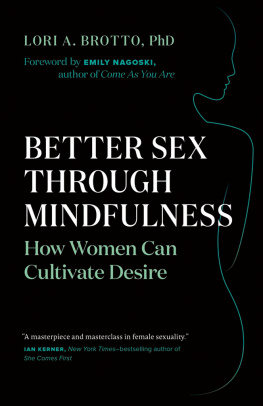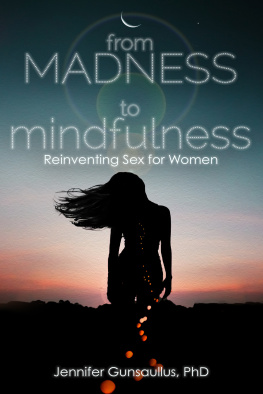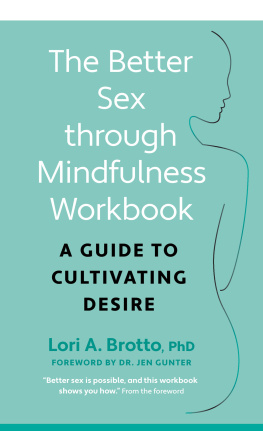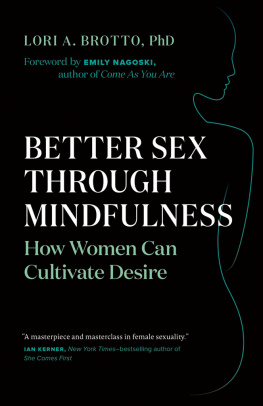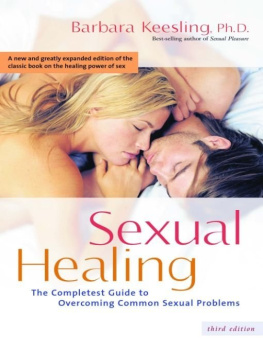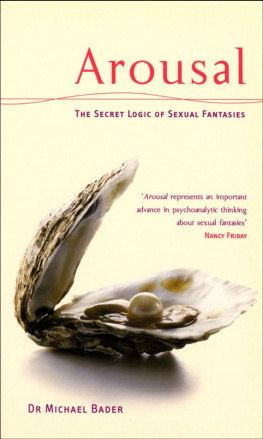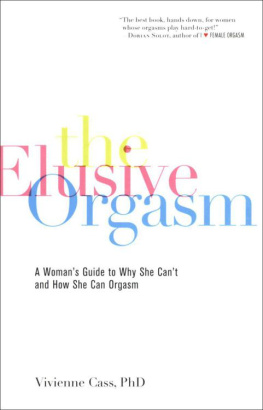
Copyright 2018 by Lori A. Brotto
Foreword copyright 2018 by Emily Nagoski
All rights reserved. No part of this book may be reproduced, stored in a retrieval system or transmitted, in any form or by any means, without the prior written consent of the publisher or a license from The Canadian Copyright Licensing Agency (Access Copyright). For a copyright license, visit www.accesscopyright.ca or call toll free to 1-800-893-5777.
Greystone Books Ltd.
www.greystonebooks.com
Cataloguing data available from Library and Archives Canada
ISBN 978-1-77164-235-4 (pbk.)
ISBN 978-1-77164-243-9 (epub)
Editing by Nancy Flight
Copyediting by Lesley Cameron
Cover and text design by Nayeli Jimenez
We gratefully acknowledge the support of the Canada Council for the Arts, the British Columbia Arts Council, the Province of British Columbia through the Book Publishing Tax Credit, and the Government of Canada for our publishing activities.

To all the women who trusted that a fulfilling
sex life was a breath away.
CONTENTS
FOREWORD

H OORAY! AT LAST!
That was my first thought when I got my hands on this important book.
My job is to travel around the world teaching women to embrace their sexuality with confidence and joy. Its the best job ever. And for more than a decade, Ive been recommending mindfulness as a key to sexual well-being. Whether theyre students, clients, readers, or strangers in airports who tell me about their sexual difficulties, whether theyre distressed about sexual desire or arousal or orgasm or pain, and whether those difficulties seem to have appeared out of the blue or are tied to trauma or illness, the research is utterly convincing: mindfulness can help.
And if that student, client, or stranger wanted to know more about how to use mindfulness to improve her sex life, Id tell her, Read Lori Brottos work. Shes doing amazing research and clinical work on mindfulness and sexual well-being for women, including those recovering from sexual trauma or gynecological cancers.
The student or stranger would say, That sounds perfect! Whats her book called?
Answer: Well, shes written a lot of peer-reviewed academic journal articles...
But nowHooray! At last!I can tell people, Its called Better Sex through Mindfulness. Its simple, practical, science-based, and, above all, overflowing with hope.
Better Sex through Mindfulness delivers even more than the title promises. It provides historical context and scientific evidence that gently erase long-standing cultural myths about sexlike the idea that sexual desire should be automatic and that sexual activity should come naturally and easily. Or that sex has a role in reproduction but is a frivolous, self-indulgent activity when pursued for pleasure. Or that sexual desire diminishes as we age, no matter what. The book reassures us that women vary. We vary both from woman to woman and across our own individual lifespan. Brotto also demystifies the tremendously wide range of normal, healthy reasons why we might want, like, and decide to have sex: Sometimes for pleasure. Sometimes for procreation. Sometimes to make our partner happy. Sometimes just to help us fall asleep. And all of those reasons (and more!) are normal.
Above all, Better Sex through Mindfulness provides simple yet powerful exercises to help you, the reader, begin practicing mindfulness (or, if you already have a mindfulness practice, to deepen that practice) to expand your sexual well-being.
Our attention tends to be a little peripatetic even under the best of circumstances. As Brotto writes, Our attention wanders like a puppy, and many of us have spent years training that puppy to wander in any direction except toward our internal sensations, especially our sexual sensations. As a result of negative sexual experiences and cultural messages, our attention has been trained to watch out for problemsto criticize our bodies, to monitor our responses during sex, and to worry about whether were doing it right or even whether we should be doing it at all. Many of us have been taught, almost from the moment of our birth, to ignore or criticize or mistrust our sexual bodies.
Mindfulness is the practice of noticing what is happening inside us and of being kind to ourselves, even when we struggle to do so. Mindfulness means giving ourselves permission to pay attentionin a neutral, nonjudgmental wayto our bodies, our beliefs about sex, and our emotions related to sex. It means being patient and being kind to ourselves. And it means being nonjudgmental. That is the secret ingredient: nonjudgment. Mindfulness improves nonjudgmental attention, and nonjudgmental attention improves sexual well-being.
One of the beautiful aspects of mindfulness as a treatment for sexual difficulties is its gentleness. It isnt always necessary to dig into the details of past traumas or childhood adversity. With mindfulness, you can notice the residue of past painful experiences, and then you can release them. Instead of focusing on them, you notice them neutrally and allow them to move on.
At the heart of mindfulness lies a deep paradox: We facilitate change by not trying to change.
Acceptance is a difficult word to apply to sexual concerns. Women resist the idea, thinking, If I accept my lack of desire, arent I just accepting that Ill have to live with it forever?
On the contrary, only by allowing ourselves to be fully aware of our internal experience can we understand it well enough to know what our bodies need.
For example, one evening in Portland, Oregon, after I had given a talk about the science of womens sexual well-being, a former student, whom I recognized and greeted with delight, came up to tell me her story.
She said, The whole time I was in school, Emily, you kept saying, Mindfulness is good for you; you should try mindfulness. Mindfulness, mindfulness. But every time I tried it, when my attention dropped down into my body, all I noticed were sirens and red flashing lights. And I thought, Why would I want to accept that? Its terrible! But I kept trying, and I kept hearing sirens and seeing red flashing lights, until eventually I wondered if maybe that wasnt normal. So I went to the doctor, and it turns out I have fibromyalgia. Id been living with pain every day and had not even known it wasnt normal. I had just blocked it from my attention so that I could cope.
My former student has continued practicing mindfulness as one of the evidence-based strategies that help her minimize the impact of her symptoms on her daily life. She finds the practice much easier now that she knows those sirens are nothing to be afraid of; they are a signal that her body is asking for help.
And by the way, she said, finally not being in pain all the time did fantastic things for my sex life.
If you allow your attention to drop down into your body and you find more suffering than you can tolerate, seek support from a professional, whether thats a therapist or a medical provider. Mindfulness is not only effective in repairing and expanding our sense of well-being (including our sexual well-being) but also in helping us hear our bodys distress signals so that we can give it the support it needs and deserves.
But the first step is to turn toward our internal experience with nonjudgment. With acceptance.
Next page
